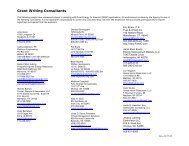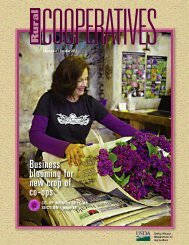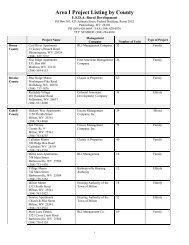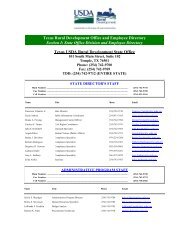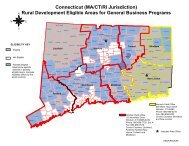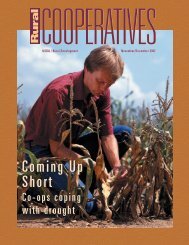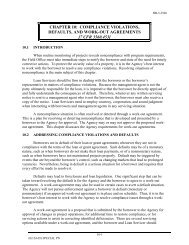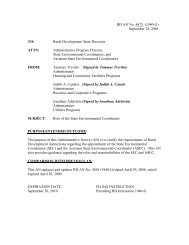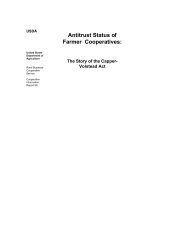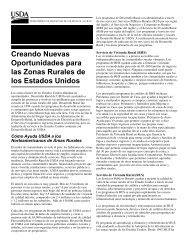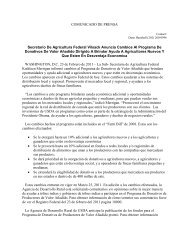How bike co-op went off track - USDA Rural Development - US ...
How bike co-op went off track - USDA Rural Development - US ...
How bike co-op went off track - USDA Rural Development - US ...
Create successful ePaper yourself
Turn your PDF publications into a flip-book with our unique Google optimized e-Paper software.
summer were farmer-owned, <strong>co</strong>mpared<br />
with eight in 10 just two years ago,<br />
ac<strong>co</strong>rding to the Renewable Fuels<br />
Association, a trade group. And with<br />
foreign and U.S. investors <strong>co</strong>mbing the<br />
<strong>co</strong>untryside for sites to build or plants<br />
to buy, a number of farmers are <strong>op</strong>ting<br />
to sell rather than risk <strong>co</strong>mpeting<br />
against the much larger privately owned<br />
plants.<br />
This spring, Global Ethanol, an<br />
Australian investment group created by<br />
a large South African bank<br />
and other investors, bought a<br />
60-percent stake in an ethanol<br />
plant in Lakota, Iowa, for<br />
$100 million. About a third of<br />
the plant’s nearly 1,300 farmer<br />
members voted against the<br />
deal.<br />
About 125 miles west, in<br />
Sioux Center, Iowa, a farmerowned<br />
ethanol <strong>co</strong><strong>op</strong>erative is<br />
weighing a merger <strong>off</strong>er from<br />
a public <strong>co</strong>mpany that it won’t<br />
identify. The plant’s general<br />
manager, Bernie Punt, said he<br />
expects the board of directors<br />
to vote on the pr<strong>op</strong>osal within the next<br />
month.<br />
A <strong>co</strong><strong>op</strong>erative effort<br />
To some farmers and politicians, the<br />
notion of sending profits from an<br />
ethanol plant to far-flung investors<br />
undermines the rationale behind the<br />
industry — that farmers reap the profits<br />
from value-added processing. It’s a sensitive<br />
issue in Minnesota, where most of<br />
the ethanol plants are still owned by<br />
farmer groups.<br />
In Winnebago, a southwestern<br />
Minnesota city with fewer than 1,500<br />
pe<strong>op</strong>le, the Corn Plus ethanol plant<br />
employs the mayor, three firefighters<br />
and two members of the city’s rescue<br />
and ambulance squad, ac<strong>co</strong>rding to general<br />
manager Keith Kor. Each spring,<br />
the plant sponsors the after-prom party<br />
at the local high school, with refreshments<br />
and prizes paid for by ethanol<br />
money.<br />
Last year, the farmer-owned plant<br />
paid $16 million in profits back to its<br />
750 shareholders.<br />
David O’Brien, owner of the Napa<br />
Auto and Farm Parts store in<br />
Winnebago, said he makes up to two<br />
deliveries a day to the plant. “No one<br />
from a big city can <strong>co</strong>mprehend what<br />
an ethanol plant means to a farming<br />
<strong>co</strong>mmunity of this size,” he said.<br />
In June, VeraSun Energy raised more<br />
than $400 million through an initial<br />
stock <strong>off</strong>ering. Before the ethanol<br />
boom, however, plant backers would<br />
spend months on the road, meeting in<br />
Bobby Johnson, with daughter Christine, says he occasionally gets<br />
snide <strong>co</strong>mments and envious glances from others in the town, due<br />
to the big pay day he got when the local ethanol plant was sold .<br />
American Legion halls, <strong>co</strong>ffee sh<strong>op</strong>s<br />
and church basements, where they<br />
would try to sell the <strong>co</strong>ncept to hundreds<br />
of individual investors.<br />
“They were like evangelical meetings,”<br />
recalled Loris VanHooserof<br />
Foley, Minn., who owns shares in the<br />
Central MN Ethanol Co-<strong>op</strong>, a plant in<br />
Little Falls, Minn. “Only pe<strong>op</strong>le who<br />
truly believed in the promise of ethanol<br />
would <strong>co</strong>mmit themselves to that much<br />
work.”<br />
Lenders usually needed more <strong>co</strong>nvincing.<br />
Directors of the Corn Plus<br />
plant, desperate for a loan in 1993,<br />
resorted to sending a batch of strawberry<br />
pies to a local bank.<br />
“In the old days, you generally had<br />
to sweeten pe<strong>op</strong>le up before they’d talk<br />
to you about ethanol,” said Bob Weerts,<br />
former chairman of Corn Plus. “Now<br />
they’re bringing us the pies.”<br />
Today, nearly one out of three farmers<br />
in Minnesota who grow at least 100<br />
acres of <strong>co</strong>rn owns shares in ethanol<br />
plants, ac<strong>co</strong>rding to the Institute for<br />
Agriculture and Trade Policy in<br />
Minneapolis.<br />
“If a farmer in the Midwest hasn’t<br />
been given a chance to invest in an<br />
ethanol plant by now, then you gotta<br />
wonder what rock he was sleeping<br />
under,” said Greg Lepper, a <strong>co</strong>rn and<br />
soybean farmer from Ashland, Ill.<br />
Some, such as Randy Buboltz of<br />
Hector, Minn., have bet heavily on the<br />
industry. The <strong>co</strong>rn and soybean farmer<br />
owns more than 100,000 shares in the<br />
Heartland Corn Products ethanol plant<br />
in Winthr<strong>op</strong>, a stake worth<br />
about $500,000. He delivers a<br />
third of his <strong>co</strong>rn cr<strong>op</strong> each<br />
year to the farmer-owned<br />
plant, and twice each day he<br />
calls up the website of the<br />
Chicago Board of Trade to<br />
check the price of ethanol<br />
futures.<br />
Buboltz said he invested<br />
in the Winthr<strong>op</strong> plant<br />
because he saw it as an attractive<br />
hedge: if <strong>co</strong>rn prices fell,<br />
the local ethanol plant got<br />
more profitable and he would<br />
receive fatter dividend checks.<br />
“It was all focused on this little<br />
dream of adding a small premium to<br />
our <strong>co</strong>rn value,” he said. “But from<br />
Wall Street’s perspective, it’s got nothing<br />
to do with that. And that’s what<br />
scares me.”<br />
Indeed, with demand for ethanol<br />
surging, plants such as the ones in<br />
Winthr<strong>op</strong> and Winnebago have be<strong>co</strong>me<br />
prime takeover targets for large <strong>co</strong>rporations,<br />
Sili<strong>co</strong>n Valley-based investors<br />
and foreign syndicates looking for quick<br />
entry into a new source of energy.<br />
In the 1990s, before ethanol really<br />
took <strong>off</strong>, Corn Plus got one or two buyout<br />
inquiries a year. The plant now gets<br />
one or two a month. Twice this spring<br />
the plant had to scuttle expansion plans<br />
after dis<strong>co</strong>vering that two out-of-state<br />
<strong>co</strong>rporations had already snatched up<br />
the sites it wanted.<br />
Rick Lunz, president of the Corn<br />
Plus board, said the ethanol plant<br />
learned the hard way that being local<br />
didn’t give it an inside edge over outside<br />
<strong>co</strong>mpetitors. “The ethanol industry is<br />
expanding so quickly that the first per-<br />
<strong>Rural</strong> Co<strong>op</strong>eratives / November/December 2006 13




